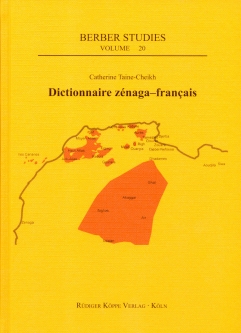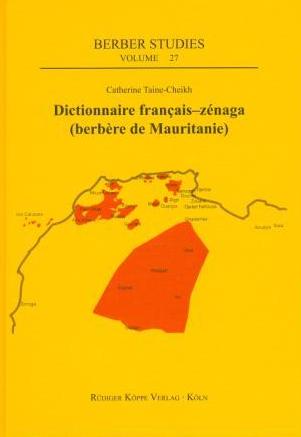



Dictionnaire zénaga-français. Le berbère de Mauritanie présenté par racines dans une perspective comparative. Avec la contribution d’Abdel Wedoud Ould Cheikh: Les communautés zénagophones aujourd’hui (Part 1)
Dictionnaire français-zénaga. Berbère de Mauritanie. Avec renvois au classement par racines du Dictionnaire zénaga-français (Part 2)
Until probably the 17th century Zenaga Berber was the dominant language from the southwest Sahara up to the embouchure of the Senegal river that took its name from this language. After the arrival of the arabophone Bani Hassan tribes, the sphere of influence of Zenaga progressively diminished. Today there are only a few thousand speakers left, all of them living in the Trarza region of Mauritania and all of them Zenaga Berber / Hassaniya Arabic bilinguals.
Zenaga undoubtedly belongs to the Berber language group, but it is a language that shows many particularities, also in comparison to the Berber languages, such as Tashelhiyt and Tamashek, that are geographically and linguistically the closest to it. Zenaga is a minority language and an endangered one, since it lacks intergeneration transmission. The linguistic particularities do not seem to be caused by language loss or massive borrowing, but by archaic retentions and some innovations.
The present book is the result of fieldwork research extended over several years, with one devoted and competent informant. It is basically a dictionary that integrates lexical data collected earlier (including the data of Mukhtar Ould Hamidoun, partly and badly published in the work of Francis Nicolas 1935). It intends to be the lexical reference work for Zenaga Berber, not only because it contains vocabulary items that are already forgotten nowadays, but also because it follows a scientific and comparative approach. After a phonological and morphosyntactic study of Zenaga, the author proceeds to a grammatical and semantic analysis of all the items and to a root classification based on linguistic and historical criteria.
This work is a research tool, surpassing by far a work that one would expect for a language with such a small number of speakers. The book is intended for berberologists and students of Afroasiatic languages. It may also be of interest to historians, sociologists and anthropologists specialised in the Arab-Berber world in general and West Africa in particular. In this book Mauritanians may, hopefully, recognize a part of their cultural heritage. They can use it either to study, or to revive a part of their linguistic past.
Both dictionaries can be ordered separately, see the following links:
© 2026 by Rüdiger Köppe Verlag – www.koeppe.de